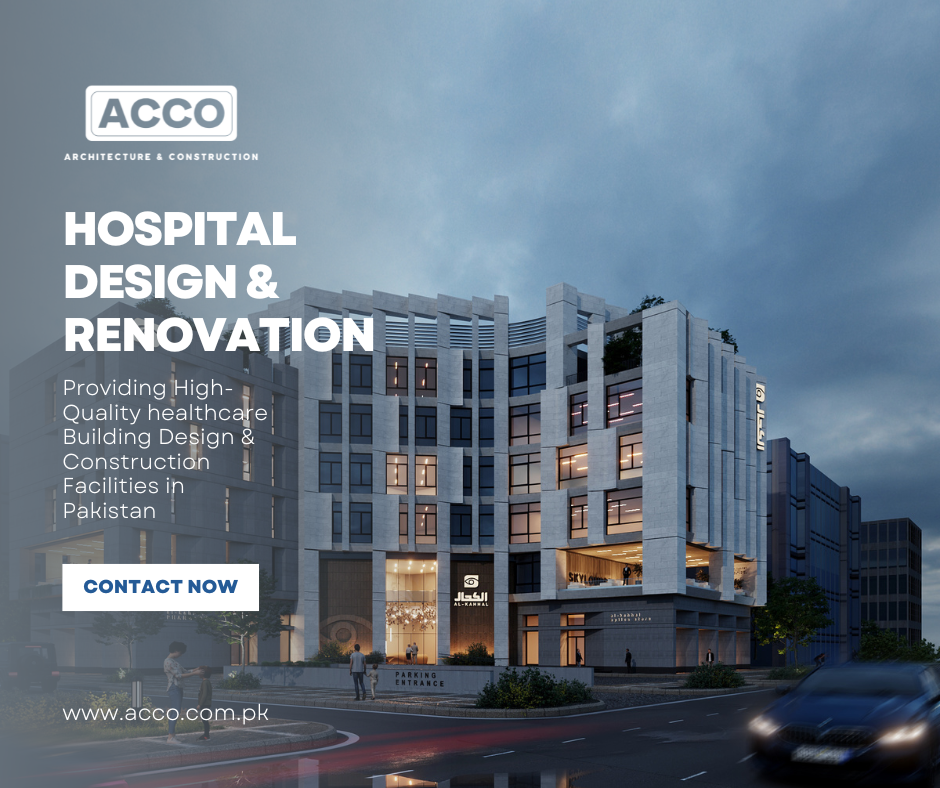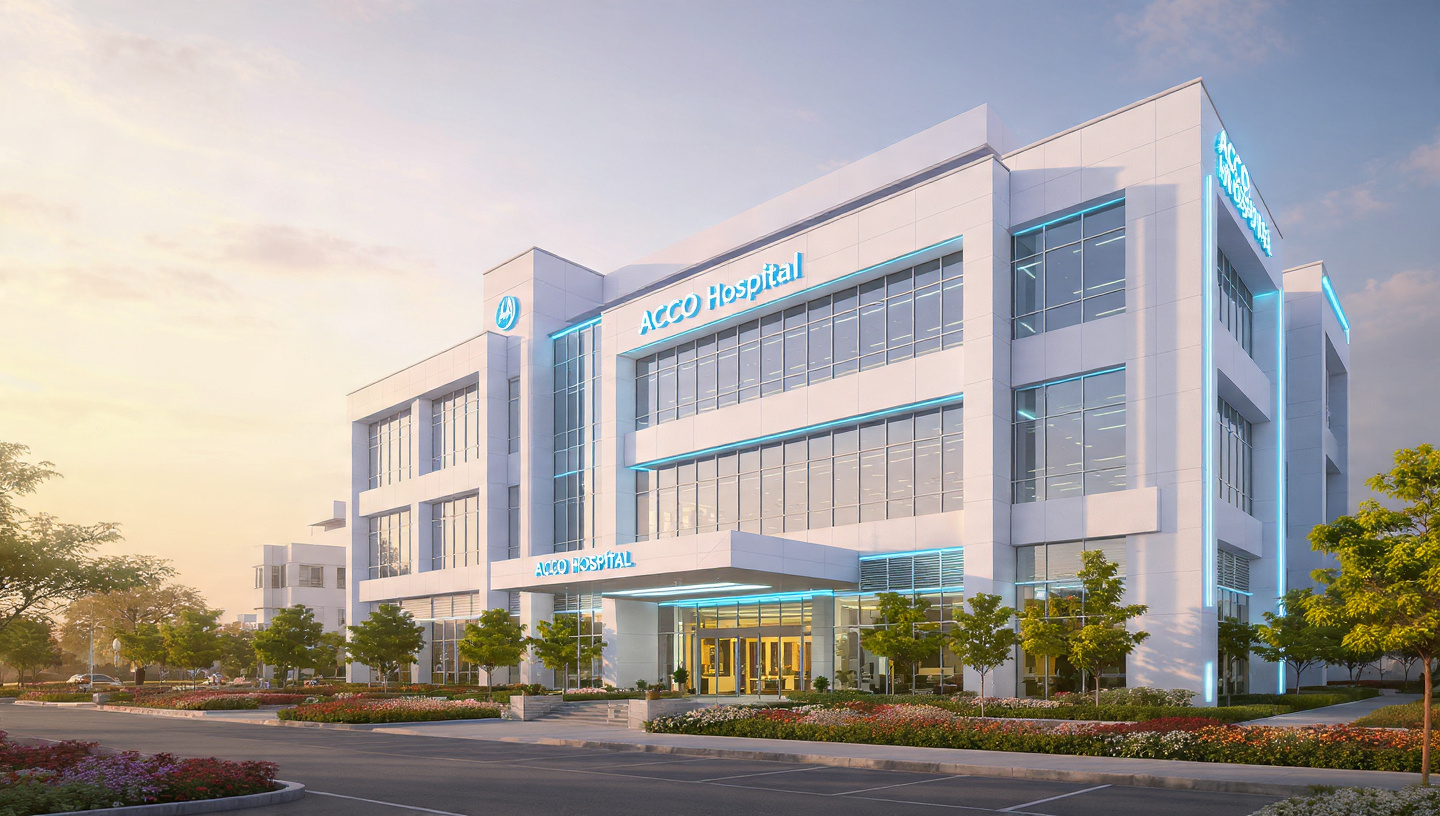
Healthcare Design Transformation by ACCO Architects: In Pakistan and Beyond
Introduction
The world of healthcare is evolving, and the design of hospitals and healthcare facilities plays a critical role in this transformation. Modern healthcare design aims to improve patient outcomes, enhance staff efficiency, and create environments that promote healing. ACCO Architects, a leading architectural firm in Pakistan, has been at the forefront of this transformation, spearheading innovative healthcare design both locally and internationally. Their commitment to blending functionality with aesthetics and adopting cutting-edge technologies has set new standards in healthcare architecture.
This article will explore how ACCO Architects are transforming healthcare design in Pakistan and beyond, focusing on key innovations, sustainable practices, and their future vision for the industry.
The Evolution of Healthcare Design
From Functional to Patient-Centered Design
In the past, hospital design primarily focused on functionality — ensuring the efficient operation of the facility. However, modern healthcare design has shifted towards a patient-centered approach. This approach emphasizes creating environments that not only support medical processes but also cater to the physical, emotional, and mental well-being of patients.
ACCO Architects have embraced this shift by designing hospitals that focus on improving the patient experience. This includes reducing stress through the use of natural light, open spaces, and calming interiors, as well as designing efficient workflows that minimize patient movement and waiting times.
Integration of Technology in Healthcare Facilities
The integration of modern technology is essential for the operation of today’s hospitals. ACCO Architects understand that healthcare facilities must be designed with future technological advancements in mind. They create smart hospitals that are equipped with digital healthcare solutions, telemedicine capabilities, and cutting-edge medical equipment. ACCO’s designs ensure that these technologies are seamlessly integrated into the hospital’s infrastructure to support advanced medical care.
ACCO’s Healthcare Design Innovations
Sustainable and Eco-Friendly Hospital Design
Sustainability is becoming increasingly important in every industry, including healthcare. ACCO Architects have integrated green building practices into their hospital designs, prioritizing energy efficiency, the use of eco-friendly materials, and the incorporation of renewable energy sources like solar power. These sustainable designs reduce the environmental impact of hospitals and help institutions save on energy costs over time.
Flexible and Adaptable Healthcare Spaces
The healthcare industry is constantly changing, and hospitals must be able to adapt to new challenges and opportunities. ACCO designs healthcare facilities with flexibility in mind, ensuring that spaces can be easily reconfigured as medical needs evolve. Whether it’s expanding patient wards, introducing new medical technologies, or adjusting for pandemic response, ACCO’s adaptable designs allow healthcare facilities to remain resilient in the face of change.
Healing Environments for Patients
Healing is not just about medical treatments; the environment in which care is provided plays a key role. ACCO Architects focus on creating healing environments that contribute to patient recovery. Their designs incorporate elements such as green spaces, natural light, and soothing colors to promote mental and physical well-being. These features not only benefit patients but also create a more positive work environment for healthcare professionals.
Transforming Healthcare Design in Pakistan
Meeting Local Healthcare Challenges
Pakistan’s healthcare system faces unique challenges, including a growing population, varying levels of access to healthcare, and limited resources in rural areas. ACCO Architects address these challenges by designing hospitals that are both cost-effective and efficient, while ensuring that they meet the highest standards of care. ACCO’s projects in Pakistan range from large urban hospitals to smaller healthcare centers in rural areas, ensuring that quality healthcare infrastructure is available across the country.
Collaboration with Healthcare Providers
ACCO’s success in transforming healthcare design lies in their collaboration with healthcare providers. By working closely with doctors, nurses, and hospital administrators, ACCO gains insights into the practical needs of medical professionals, ensuring that their designs improve operational efficiency and patient care.
ACCO’s Impact Beyond Pakistan
International Projects and Expertise
ACCO Architects are not limited to transforming healthcare design within Pakistan. Their innovative approach has gained international recognition, and they have been involved in several healthcare projects beyond Pakistan’s borders. ACCO’s international expertise enables them to bring global best practices to their designs, ensuring that healthcare facilities are on par with world-class standards.
Bridging the Gap Between Global Standards and Local Needs
In their international projects, ACCO Architects bridge the gap between global healthcare design standards and local cultural and healthcare needs. By adapting their designs to suit the unique requirements of each region, they create facilities that are both innovative and culturally sensitive. This ability to combine local insights with international expertise is one of the key factors behind ACCO’s success in healthcare design.
Sustainability in Healthcare Design: A Global Perspective
Energy-Efficient Hospitals
Around the world, there is a growing demand for hospitals to be more energy-efficient. ACCO Architects have developed solutions that significantly reduce the energy consumption of healthcare facilities. From advanced insulation materials to smart energy management systems, their designs ensure that hospitals not only provide excellent care but also contribute to a sustainable future.
Green Building Certifications
As part of their commitment to sustainability, ACCO works towards obtaining green building certifications such as LEED (Leadership in Energy and Environmental Design) for their healthcare projects. These certifications highlight the environmental performance of hospitals, ensuring that healthcare institutions are recognized for their contributions to environmental sustainability.
The Future of Healthcare Design with ACCO
Advancing Smart Hospital Concepts
As technology continues to advance, the concept of the smart hospital will become increasingly important. ACCO is at the forefront of this movement, designing healthcare facilities that are fully integrated with digital healthcare systems, allowing for real-time monitoring, data-driven decision-making, and enhanced patient care.
Pandemic-Prepared Hospital Designs
The COVID-19 pandemic highlighted the need for hospitals to be prepared for unexpected health crises. ACCO has responded by designing hospitals that are equipped to handle pandemics and other public health emergencies. These designs include modular isolation units, enhanced air filtration systems, and flexible treatment spaces that can be quickly reconfigured during a crisis.
Conclusion
ACCO Architects are transforming healthcare design in Pakistan and beyond through their innovative, patient-centered, and sustainable approach to hospital architecture. By combining cutting-edge technology, flexible design, and eco-friendly practices, they are setting new standards for healthcare facilities. Their ability to address both local and global healthcare challenges has made them a leader in the field, and their designs are shaping the future of healthcare infrastructure around the world.




